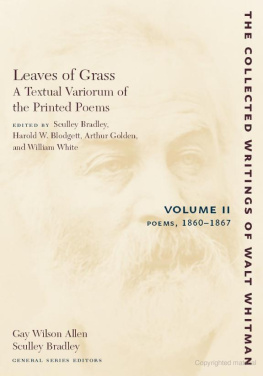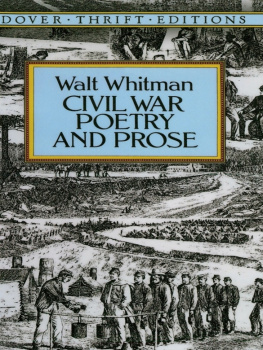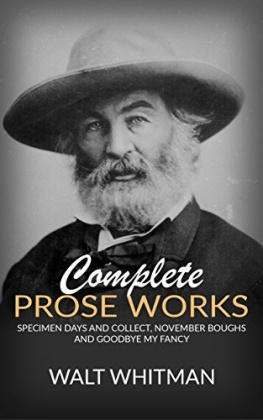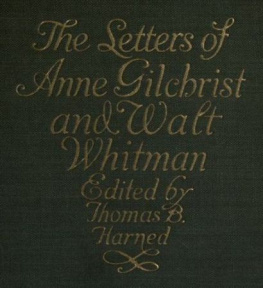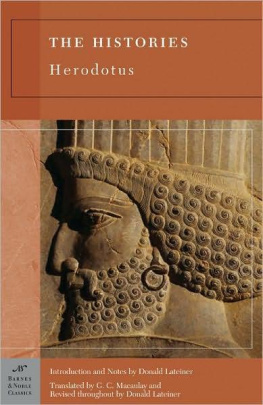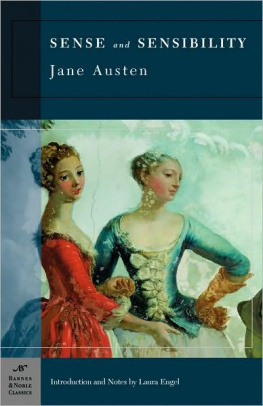
Table of Contents
FROM THE PAGES OFLEAVES OF GRASS
I am the poet of the body,
And I am the poet of the soul.
(FROM SONG OF MYSELF, 1855, PAGE 48)
Walt Whitman, an American, one of the roughs, a kosmos,
Disorderly fleshy and sensual .... eating drinking and breeding,
No sentimentalist .... no stander above men and women or apart
from them .... no more modest than immodest.
Unscrew the locks from the doors!
Unscrew the doors themselves from their jambs!
(FROM SONG OF MYSELF, 1855, PAGE 52)
I have perceived that to be with those I like is enough,
To stop in company with the rest at evening is enough,
To be surrounded by beautiful curious breathing laughing flesh
is enough,
To pass among them ... to touch any one .... to rest my arm ever
so lightly round his or her neck for a moment .... what is this
then?
I do not ask any more delight .... I swim in it as in a sea.
(FROM I SING THE BODY ELECTRIC, 1855, PAGE 121)
To the States or any one of them, or any city of the States,
Resist much, obey little.
(FROM TO THE STATES, PAGE 173)
Shut not your doors to me proud libraries,
For that which was lacking on all your well-filld shelves, yet
needed most, I bring,
Forth from the war emerging, a book I have made,
The words of my book nothing, the drift of it every thing.
(FROM SHUT NOT YOUR DOORS, PAGE 176)
[These women] are not one jot less than I am,
They are tannd in the face by shining suns and blowing winds,
Their flesh has the old divine suppleness and strength,
They know how to swim, row, ride, wrestle, shoot, run, strike,
retreat, advance, resist, defend themselves,
They are ultimate in their own rightthey are calm, clear,
well-possessd of themselves.
(FROM A WOMAN WAITS FOR ME, PAGES 263-264)
City of the world! (for all races are here,
All the lands of the earth make contributions here;)
City of the sea! city of hurried and glittering tides!
City whose gleeful tides continually rush or recede, whirling in
and out with eddies and foam!
City of wharves and storescity of tall faades of marble and iron!
Proud and passionate citymettlesome, mad, extravagant city!
(FROM CITY OF SHIPS, PAGE 444)
O Captain! my Captain! our fearful trip is done,
The ship has weatherd every rack, the prize we sought is won,
The port is near, the bells I hear, the people all exulting,
While follow eyes the steady keel, the vessel grim and daring;
But O heart! heart! heart!
O the bleeding drops of red,
Where on the deck my Captain lies,
Fallen cold and dead.
(FROM O CAPTAIN! MY CAPTAIN! PAGE 484)
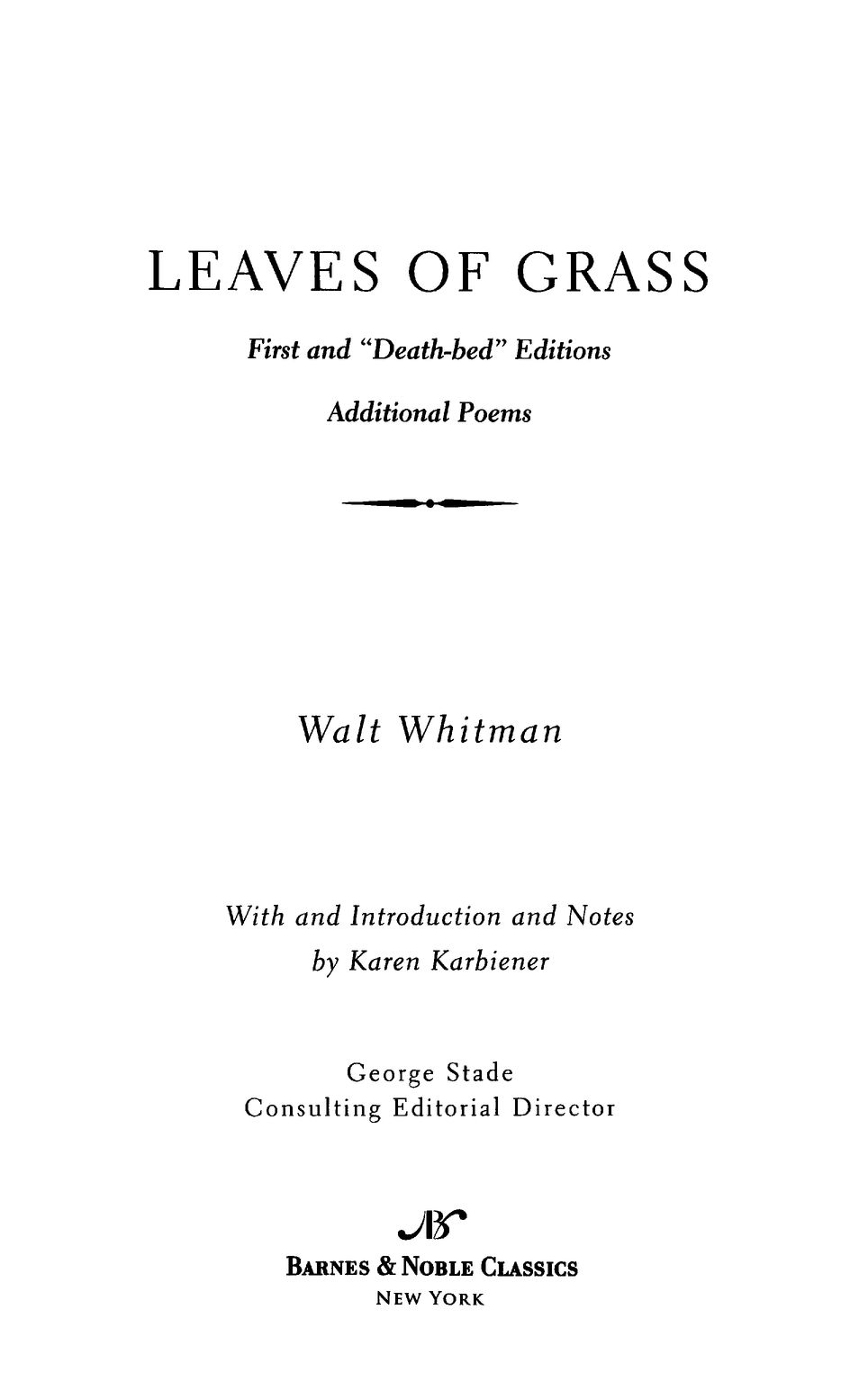
WALT WHITMAN
Walt Whitman was born on May 31, 1819, on a farm near West Hills, New York, on Long Island. In 1823, Walter Senior moved his growing family to Brooklyn, where he worked as a carpenter and introduced Walt to freethinkers and reformers like the Quaker preacher Elias Hicks and womens rights activist Frances Wright. One of Whitmans most vivid childhood memories was of being hoisted onto the shoulders of General Lafayette during a visit the Revolutionary War hero made to New York.
While many notable American figures of the mid-nineteenth century, such as Henry Wadsworth Longfellow and Nathaniel Hawthorne, were the privileged sons of well-established families, Whitman was, at least on the basis of his humble origins, indeed a man of the people. His mother, Louisa Van Velsor, an unfailing supporter of her literary-minded son, was barely literate; of the seven Whitman offspring who survived infancy, Eddy was mentally disabled, Jesse spent much of his life in an insane asylum, Andrew died young of alcoholism and tuberculosis, and Hannah married an abusive man who repeatedly beat her. Whitman was confronted with these often sordid family matters through much of his adult life.
Walt dropped out of school when he was eleven, though he continued to read widely and soon entered the newspaper business as a printers apprentice. Before long he was editing and writing for some of the most popular newspapers of the day. He reported on the crimes, fires, civic achievements, and other events that shaped rapidly growing New York in the 1830s and 1840s; he reviewed concerts, attended operas, and socialized with other writers and artists; and, always observing, notebook in hand, he walked the streets of the city that had fueled his imagination since his youth and inspired such poems as Crossing Brooklyn Ferry.
Whitman came onto the literary scene quietly. The First Edition of Leaves of Grass received little notice when it appeared in 1855, though such distinguished American men of letters as Ralph Waldo Emerson recognized the twelve poems included in the slim volume, with Whitmans photo on the frontispiece, as a major literary achievement. Whitman spent the rest of his life revising and editing Leaves of Grass, incorporating new collections of poems into subsequent editions of his masterpiece. Though he more or less gave up journalism by the early 1860s, he continued to observe with a reporters eye, working his experiences into his poetry. The often disturbing wartime poems he included in such collections as Drum-Taps and Sequel to Drum-Taps took root in the visits he made to soldiers in Washington, D.C., hospitals during the Civil War. His romantic relationships also worked their way into his poetry, especially those in his Calamus collection, making Whitman one of the first American poets to openly address homosexuality.
Many of Whitmans contemporaries were shocked by Leaves of Grass, and in 1882 a Boston printing was banned when the work was declared immoral. Even so, the poet continued to gain a reputation in America and, even more so, in Britain. After suffering a stroke in 1873, Whitman moved from Washington to Camden, New Jersey, where he spent the greater part of his remaining days writing, overseeing new editions of Leaves of Grass, and receiving visitors. Just ten days after writing his last poem, A Thought of Columbus, Walt Whitman died on March 26, 1892.
THE WORLD OF WALT WHITMAN AND LEAVES OF GRASS
| 1819 | Walter Whitman is born on May 31 in West Hills, Long Is land, the second of nine children of Louisa Van Velsor and Walter Whitman, a carpenter. Herman Melville is also born this year. Ode to a Nightingale, by John Keats, appears. |
| 1823 | The senior Whitman moves his family to Brooklyn, anticipat ing that a building boom will create a demand for carpenters. |
| 1830 | Young Walt leaves school, works as an office boy, and con tinues his education through reading. |
| 1831 | Whitman takes an apprenticeship at the printing office of the |


